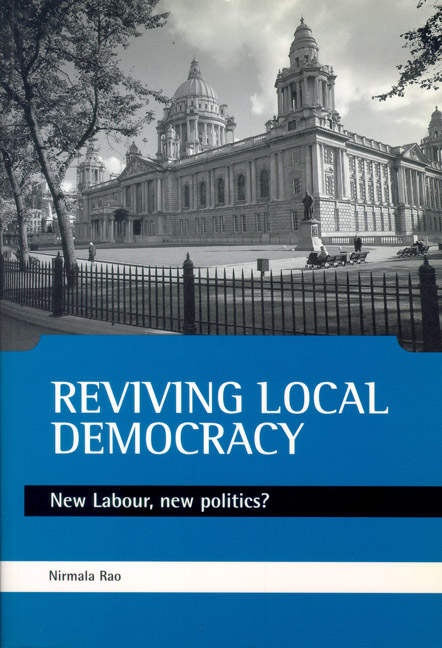Book contents
- Frontmatter
- Contents
- List of tables
- Acknowledgements
- one New times for local democracy
- two Local democracy and after
- three The failed promise of reform
- four Civic-minded Britain?
- five The reluctant voter
- six The third way and democratic reform
- seven The modernising agenda: enhancing participation
- eight The modernising agenda: new forms of political leadership
- nine Prospects for a new politics
- Bibliography
- Appendix A The surveys
- Appendix B The legislation
- Index
six - The third way and democratic reform
Published online by Cambridge University Press: 05 July 2022
- Frontmatter
- Contents
- List of tables
- Acknowledgements
- one New times for local democracy
- two Local democracy and after
- three The failed promise of reform
- four Civic-minded Britain?
- five The reluctant voter
- six The third way and democratic reform
- seven The modernising agenda: enhancing participation
- eight The modernising agenda: new forms of political leadership
- nine Prospects for a new politics
- Bibliography
- Appendix A The surveys
- Appendix B The legislation
- Index
Summary
In contesting the 1997 general election, the Labour manifesto, New Labour: Because Britain deserves better (Labour Party, 1997), offered the electorate “a new politics”. This new politics was intended to renew public faith, as the Labour government would govern in the interest of the many and “set British political life on a new course for the future”. For each area of policy set out in the manifesto, a new and distinctive approach was mapped out, and presented as “one that differs both from the solutions of the old Left and those of the Conservative Right”. This was to be no middle way: it was the ‘third way’.
The idea of a third way politics – neither socialist nor free market, but a revitalised social democracy – was fully elaborated by Anthony Giddens (Giddens, 1998). In a later apologia Giddens argued:
Third Way politics is not, as it is so often portrayed, a capitulation to neo-liberalism. On the contrary, it emphasises the core importance of active government and the public sphere…. The public sphere does not coincide with the domain of the State. State institutions can diminish or discredit the realm of the public when they become oversized, bureaucratic or otherwise unresponsive to citizens’ needs. The neoliberals were right to criticise the State in these respects, but wrong to suppose that the public good can be better supplied by markets. (Giddens, 2000, pp 163-4)
Institutional reform occupied a central place in Giddens’ view of the new politics; far from neglecting the public realm, the third way politics “offers the means of reconstructing and renewing public institutions” (Giddens, 2000, p 29). This reconstruction, which aims to restore confidence in government and its performance, is a first priority: government and state institutions need to be made “as effective and quick on their feet as many sectors of business have now become” (Giddens, 2000, p 58). But something more than reform in the interests of efficiency lies at the heart of this project: the most important objective is to make political institutions more responsive and more open. As Giddens puts it, what is needed is a second wave of democratisation – or what he calls the ‘democratising of democracy’.
- Type
- Chapter
- Information
- Reviving Local DemocracyNew Labour, New Politics?, pp. 119 - 132Publisher: Bristol University PressPrint publication year: 2000



